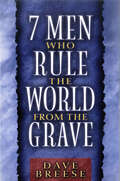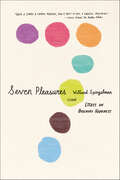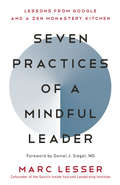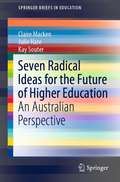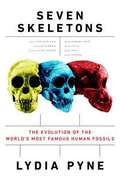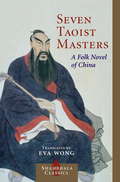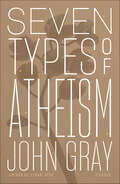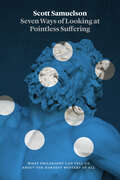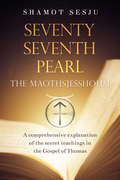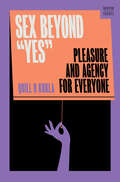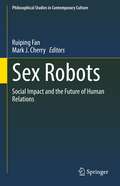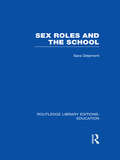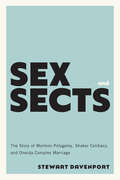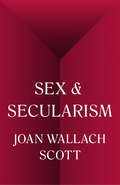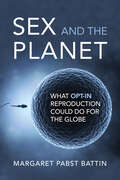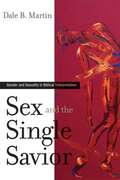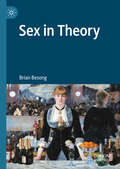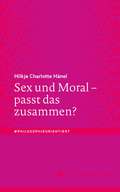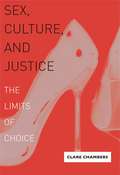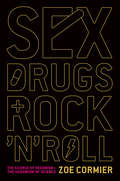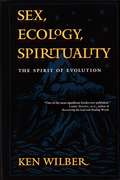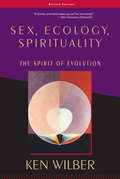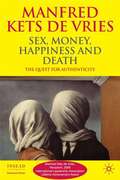- Table View
- List View
Seven Men Who Rule the World From the Grave
by Dave BreeseThough their bodies lie cold and dormant, the grave cannot contain the influence these seven men have had on today's world. They continue to rule because they have altered the thinking of society. They generated philosophies that have been ardently grasped by masses of people but are erroneous and antiscriptural. Today these ideas pervade our schools, businesses, homes, and even the church. As we continue to unknowingly subscribe to their philosophies, we keep the grave open for Charles Darwin, Karl Marx, Julius Wellhausen, John Dewey, Sigmund Freud, John Maynard Keynes, and Soren Kierkegaard. Dave Breese warns us of the dangers of believing unreservedly the ideas of these seven men. He also reminds us of the only man whose life and words we can trust completely- Jesus Christ.
Seven Men Who Rule the World From the Grave
by Dave BreeseThough their bodies lie cold and dormant, the grave cannot contain the influence these seven men have had on today's world. They continue to rule because they have altered the thinking of society. They generated philosophies that have been ardently grasped by masses of people but are erroneous and antiscriptural. Today these ideas pervade our schools, businesses, homes, and even the church. As we continue to unknowingly subscribe to their philosophies, we keep the grave open for Charles Darwin, Karl Marx, Julius Wellhausen, John Dewey, Sigmund Freud, John Maynard Keynes, and Soren Kierkegaard. Dave Breese warns us of the dangers of believing unreservedly the ideas of these seven men. He also reminds us of the only man whose life and words we can trust completely- Jesus Christ.
Seven Pleasures: Essays on Ordinary Happiness
by Willard SpiegelmanWhat does it mean to be happy? Americans have had an obsession with "the pursuit of happiness" ever since the Founding Fathers enshrined it—along with life and liberty—as our national birthright. Whether it means the accumulation of wealth or a more vaguely understood notion of self-fulfillment or self-actualization, happiness has been an inevitable, though elusive, goal.But it is hard to separate "real" happiness from the banal self-help version that embraces mindless positive thinking. And though we have two booming "happiness industries"—religion, with its promise of salvation, and psychopharmacology, with its promise of better living through chemistry—each comes with its own problems and complications.In Seven Pleasures, Willard Spiegelman takes a look at the possibilities for achieving ordinary secular happiness without recourse to either religion or drugs. In this erudite and frequently hilarious book of essays, he discusses seven activities that lead naturally and easily to a sense of well-being. One of these—dancing—requires a partner, and therefore provides a lesson in civility, or good citizenship, as one of its benefits. The other six—reading, walking, looking, listening, swimming, and writing—are things one performs alone. Seven Pleasures is a marvelously engaging guide to the pursuit of happiness, and all its accompanying delights.
Seven Practices of a Mindful Leader: Lessons from Google and a Zen Monastery Kitchen
by Marc LesserWhat would your work and your life look like if you knew how to stay focused yet flexible, if you got more of the right things done, and if you were helping to create a more peaceful world at the same time? &“A mindful leader makes the work environment a generative social field in which compassion, connection, and creativity thrive. The seven accessible practices in this book can teach you how to become just such a leader.&” — from the foreword by Daniel J. Siegel, MD, executive director of Mindsight Institute Today&’s leaders are grappling with the pace and complexity of change, the challenge of supporting healthy collaboration and alignment among teams, and the resulting stress and burnout. The practice of mindful leadership may be one of the most important competencies in business today if leaders are to move beyond fear, anxiety, nagging self-doubt, and the feeling of constant overwhelm. Marc Lesser has taught his proven seven-step method to leaders at Google, Genentech, SAP, Facebook, and dozens of other Fortune 500 companies for over twenty years and has distilled a lifetime of mindfulness and business experience into these chapters. This incredibly practical yet accessible book draws on Marc&’s experience as a CEO of three companies, as cofounder of the world-renowned Search Inside Yourself (SIY) program within Google, and as a longtime Zen practitioner. The principles in this book can be applied to leadership at any level, providing readers with the tools they need to shift awareness, enhance communication, build trust, eliminate fear and self-doubt, and minimize unnecessary workplace drama. Embracing any one of the seven practices alone can be life-changing. When used together, they support a path of well-being, productivity, and positive influence. Practicing mindful leadership will allow you to achieve results — with more energy, clarity, meaning, and connection. Your intentions and actions will be more aligned. You will accomplish more with less wasted effort. After reading this book, you&’ll understand why some of the world&’s most successful companies routinely incorporate the Seven Practices of a Mindful Leader, integrating mindfulness, emotional intelligence, and business savvy to create great corporate cultures, and even a better world.
Seven Radical Ideas for the Future of Higher Education: An Australian Perspective (SpringerBriefs in Education)
by Claire Macken Julie Hare Kay SouterThis book focuses on the disruption of the tertiary higher education system as a result of societal changes occasioned by the Fourth Industrial Revolution and hastened by COVID-19. It takes the view that higher education is on an inevitable trajectory of disruption as a result of globalisation, technological disruption, and disaggregation of the formal education sector but that it must not lose sight of its central role in equipping current and future students for the new economy. The book takes a student-centric - and big-picture approach - examining some of the biggest challenges facing massified higher education systems. The authors consider ways to achieve modern, responsive and efficient higher education systems globally that are economically sound for governments and affordable for individuals.
Seven Skeletons: The Evolution of the World's Most Famous Human Fossils
by Lydia PyneAn irresistible journey of discovery, science, history, and myth making, told through the lives and afterlives of seven famous human ancestorsOver the last century, the search for human ancestors has spanned four continents and resulted in the discovery of hundreds of fossils. While most of these discoveries live quietly in museum collections, there are a few that have become world-renowned celebrity personas--ambassadors of science that speak to public audiences. In Seven Skeletons, historian of science Lydia Pyne explores how seven such famous fossils of our ancestors have the social cachet they enjoy today.Drawing from archives, museums, and interviews, Pyne builds a cultural history for each celebrity fossil--from its discovery to its afterlife in museum exhibits to its legacy in popular culture. These seven include the three-foot tall "hobbit" from Flores, the Neanderthal of La Chapelle, the Taung Child, the Piltdown Man hoax, Peking Man, Australopithecus sediba, and Lucy--each embraced and celebrated by generations, and vivid examples of how discoveries of how our ancestors have been received, remembered, and immortalized. With wit and insight, Pyne brings to life each fossil, and how it is described, put on display, and shared among scientific communities and the broader public. This fascinating, endlessly entertaining book puts the impact of paleoanthropology into new context, a reminder of how our past as a species continues to affect, in astounding ways, our present culture and imagination.From the Hardcover edition.
Seven Taoist Masters: A Folk Novel of China
by Eva WongHistory and legend are interwoven in this folk novel that both entertains and instructs. Written by an unknown author, Seven Taoist Masters is the story of six men and one woman who overcome tremendous hardships on the journey to self-mastery. These characters and their teacher, Wang Ch'ung-yang, are all historical figures who lived in the Southern Sung (1127-1279) and Yuan (1271-1368) dynasties. Wang is regarded as the greatest patriarch of the Complete Reality school, a highly purified branch of Taoism having a strong affinity with Zen Buddhism. The novel brings to life the essentials of Taoist philosophy and practice, both through the instructions offered by Wang--on topics such as the cultivation of mind and body, meditation techniques, and overcoming the obstacles to enlightenment--and through the experiences of the characters.
Seven Types of Atheism
by John GrayFrom the provocative author of Straw Dogs comes an incisive, surprising intervention in the political and scientific debate over religion and atheismWhen you explore older atheisms, you will find that some of your firmest convictions—secular or religious—are highly questionable. If this prospect disturbs you, what you are looking for may be freedom from thought.For a generation now, public debate has been corroded by a shrill, narrow derision of religion in the name of an often vaguely understood “science.” John Gray’s stimulating and enjoyable new book, Seven Types of Atheism, describes the complex, dynamic world of older atheisms, a tradition that is, he writes, in many ways intertwined with and as rich as religion itself.Along a spectrum that ranges from the convictions of “God-haters” like the Marquis de Sade to the mysticism of Arthur Schopenhauer, from Bertrand Russell’s search for truth in mathematics to secular political religions like Jacobinism and Nazism, Gray explores the various ways great minds have attempted to understand the questions of salvation, purpose, progress, and evil. The result is a book that sheds an extraordinary light on what it is to be human.
Seven Ways of Looking at Pointless Suffering: What Philosophy Can Tell Us about the Hardest Mystery of All
by Scott SamuelsonIt’s right there in the Book of Job: “Man is born unto trouble as the sparks fly upward.” Suffering is an inescapable part of the human condition—which leads to a question that has proved just as inescapable throughout the centuries: Why? Why do we suffer? Why do people die young? Is there any point to our pain, physical or emotional? Do horrors like hurricanes have meaning? In Seven Ways of Looking at Pointless Suffering, Scott Samuelson tackles that hardest question of all. To do so, he travels through the history of philosophy and religion, but he also attends closely to the real world we live in. While always taking the question of suffering seriously, Samuelson is just as likely to draw lessons from Bugs Bunny as from Confucius, from his time teaching philosophy to prisoners as from Hannah Arendt’s attempts to come to terms with the Holocaust. He guides us through the arguments people have offered to answer this fundamental question, explores the many ways that we have tried to minimize or eliminate suffering, and examines people’s attempts to find ways to live with pointless suffering. Ultimately, Samuelson shows, to be fully human means to acknowledge a mysterious paradox: we must simultaneously accept suffering and oppose it. And understanding that is itself a step towards acceptance. Wholly accessible, and thoroughly thought-provoking, Seven Ways of Looking at Pointless Suffering is a masterpiece of philosophy, returning the field to its roots—helping us see new ways to understand, explain, and live in our world, fully alive to both its light and its darkness.
Seventy-seventh Pearl: The Maothsjesshoum
by Shamot SesjuThrough tearful eyes a young girl asked Pope Francis; why does God allow children to suffer? The answer revealed what atheists have long suspected - theists rely on blind faith. This book opens the readers' eyes. It is the logical, undeniable truth. In the Gospel of Thomas, Jesus promises that people who discover the meaning of his sayings would not taste death. Since the time Thomas recorded these sayings people have tried to unravel their meaning. The Seventy-seventh Pearl: The Maothsjesshoum is the second coming. It is the completion of Jesus' purpose in this world. The Seventy-seventh Pearl lives - in you.
Sex Beyond "Yes": Pleasure and Agency for Everyone (A Norton Short)
by Quill R. KuklaPhilosopher Quill R Kukla questions traditional notions of consent in this honest, humanistic reimagining of what it means to have pleasurable, ethical, and respectful sex. Every discussion of sexual ethics revolves around consent, but is this notion enough to help us understand good sex? How does the dominance of consent help or prevent us from negotiating the complexities of intimacy and pleasure? Georgetown professor Quill R Kukla argues that the idea that consent is the gatekeeper between the realms of good and bad sex does not give us the tools we need to navigate pleasure and intimacy. They claim that traditional discussions of consent make no room for the reality that we can have good sex even though we may get drunk or high, or become forgetful with age, or be limited by social pressures and power relationships Kukla explores the ambiguous realms in which sexual agency requires much more than the ability to just say "yes" or "no" to sex. They confront moments of discomfort: How does consent work for people with dementia, a condition that is also associated with increased libido? Or in sex work, where sexual contracts challenge our traditional conceptions of ethical sex? How can we express our agency when exploring new kinks, where our hesitations and ambivalence are part of the thrill? Or even in everyday sex—where partners inevitably differ in enthusiasm, power dynamics, and experience? Combining rigorous research and universal lessons that apply both in and out of the bedroom, Kukla approaches the concepts of sexual agency, sexual pleasure, and consent with unapologetic verve. Challenging readers to think beyond reductive concepts of consent, gender, and freedom, Sex Beyond "Yes" reframes the communication and social support we need to establish sexual relationships founded on genuine respect, open discourse, and unhindered joy.
Sex Robots: Social Impact and the Future of Human Relations (Philosophical Studies in Contemporary Culture #28)
by Ruiping Fan Mark J. CherryThis book provides cross-cultural ethical exploration of sex robots and their social impact. What are the implications of sex robots and related technological innovations for society and culture? How should we evaluate the significance of sexual relations with robots that look like women, men or children? Critics argue that sex robots present a clear risk to real persons and a social degradation that will increase sexual violence, objectify women, encourage pedophilia, reinforce negative body images, increase forms of sexual dysfunction, and pass on sexually transmitted disease. Proponents judge robotic sexual companionship as just another step in the exploration of human desire. They see sex robots, and similar technology, such as virtual reality pornography, as providing autonomy affirming companionship for the lonely and a relatively harmless outlet for sexual fantasies that avoids the use of human prostitutes and thus reduces sexual victimization. Some appreciate sex robots as a social evil, others as a positive good, and still others as a harmless pastime. How we come to terms with such conceptual and moral concerns will have significant implications for society and the future of human relations. This book is of great interest to researchers in bioethics, human sexual behavior, AI ethics, and philosophy of sex.
Sex Roles and the School (Routledge Library Editions: Education)
by Sara DelamontSchools reflect the society which surrounds them but they must also be agents of change. The last few decades have seen an explosion of research on gender and education and, in this volume the author examines in a rigorous but highly accessible way, new research findings and new strategies for change, continuing to argue that both sexes lose out from sexist schooling.
Sex and Sects: The Story of Mormon Polygamy, Shaker Celibacy, and Oneida Complex Marriage (American Spirituality)
by Stewart DavenportWith a revolution behind them, a continent before them, and the First Amendment protecting them, religio-sexual pioneers in antebellum America were free to strike out on their own, breaking with the orthodoxies of the past. Shakers followed the ascetic path; Oneida Perfectionists accepted sex as a gift from God; and Mormons redefined marriage in light of new religious revelations that also redefined God, humankind, spirit, and matter. Sex became a powerful way for each group to reinforce their sectarian identity as strangers in a strange land. Sex and Sects tells the story of these three religiously inspired sexual innovations in America: the celibate lifestyle of the Shakers, the Oneida Community’s system of controlled polyamory, and plural marriage as practiced by the Mormons. Stewart Davenport analyzes why these bold experiments rose and largely fell over the course of the nineteenth century within the confines of the new American republic. Moving beyond a social-scientific lens, Davenport traces for the first time their fascinating shared trajectory as they emerged, struggled, institutionalized, and declined in tandem—and sheds historical light on the way in which Americans have discussed, contested, and redefined the institutions of marriage and family both in our private lives and in the public realm.
Sex and Secularism
by Joan Wallach ScottHow secularism has been used to justify the subordination of womenJoan Wallach Scott’s acclaimed and controversial writings have been foundational for the field of gender history. With Sex and Secularism, Scott challenges one of the central claims of the “clash of civilizations” polemic—the false notion that secularism is a guarantee of gender equality.Drawing on a wealth of scholarship by second-wave feminists and historians of religion, race, and colonialism, Scott shows that the gender equality invoked today as a fundamental and enduring principle was not originally associated with the term “secularism” when it first entered the lexicon in the nineteenth century. In fact, the inequality of the sexes was fundamental to the articulation of the separation of church and state that inaugurated Western modernity. Scott points out that Western nation-states imposed a new order of women’s subordination, assigning them to a feminized familial sphere meant to complement the rational masculine realms of politics and economics. It was not until the question of Islam arose in the late twentieth century that gender equality became a primary feature of the discourse of secularism.Challenging the assertion that secularism has always been synonymous with equality between the sexes, Sex and Secularism reveals how this idea has been used to justify claims of white, Western, and Christian racial and religious superiority and has served to distract our attention from a persistent set of difficulties related to gender difference—ones shared by Western and non-Western cultures alike.
Sex and the Planet: What Opt-In Reproduction Could Do for the Globe (Basic Bioethics)
by Margaret Pabst BattinWhat if human reproduction was always elective? A prominent bioethicist speculates about the possibilities—and the likely consequences.What would the world be like if all pregnancy was intended, not unintended as it is nearly half the time now? Considerably better, Margaret Pabst Battin suggests in Sex and the Planet, a provocative thought experiment with far-reaching real-world implications. Many of the world&’s most vexing and seemingly intractable issues begin with sex—when sperm meets egg, as Battin puts it—abortion, adolescent pregnancy, high-risk pregnancy, sexual violence, population growth and decline. Rethinking reproductive rights and exposing our many mistaken assumptions about sex, Sex and the Planet offers an optimistic picture of how we might solve these problems—by drastically curtailing unintended pregnancies using currently available methods.How we see this picture—as recommendation, prediction, utopian fantasy, totalitarian plot, hypothetical conjecture, or realistic solution—depends to a great degree on which of thirteen problematic assumptions we maintain, assumptions Battin works to identify and challenge. Taking on sensitive topics like abortion and rape and religious issues around contraception, she shows how a fully informed, nonideological approach could defuse much of the friction such issues tend to generate. Also, in her attention to male contraception and the asymmetry of female and male reproductive control, she pulls in the 50 percent of the human race—those with Y chromosomes—largely left out of discussions of reproductive health. Sex and the Planet, finally, takes a global view, inviting us to consider a possible—even plausible—reproductive future.
Sex and the Single Savior: Gender and Sexuality in Biblical Interpretation
by Dale B. MartinProbing into numerous questions about gender and sexuality, Dale Martin delves into the biblical texts anew and unearths surprising findings. <p><p> Avoiding preconceptions about ancient sexuality, he explores the ethics of desire and marriage and pays careful attention to the original meanings of words, especially those used as evidence of Paul's opposition to homosexuality. For example, after a remarkably faithful reading of the scriptural texts, Martin concludes that our contemporary obsession with marriage--and the whole search for the "right" sexual relationships--is antithetical to the message of the gospel. <p><p> In all of these essays, however, Martin argues for engaging Scripture in a way that goes beyond the standard historical-critical questions and the assumptions of textual agency in order to find a faith that has no foundations other than Jesus Christ.
Sex in Theory
by Brian BesongThis volume explores the major moral theories and their distinctive approaches and controversial implications regarding sex. Despite being a commonplace human activity, contemporary discussions of the norms regarding sex—particularly those that connect with the major moral theories—are relatively rare. This volume shows that the relative silence is important, for all the major moral theories appear to have controversial implications about the morality and value of sex. Consequently, either widespread Western assumptions about sex are mistaken or else the major moral theories have serious problems when it comes to the ethics of the bedroom. Adopting a metaethical Mooreanism about our sexual intuitions offers a potential compromise, such that some of the more novel and controversial Western intuitions are abandoned with resulting room for at least one moral theory to remain viable.
Sex und Moral – passt das zusammen? (#philosophieorientiert)
by Hilkje Charlotte HänelSex. Die meisten von uns haben ihn. Mal schlecht, mal gut, manchmal phänomenal. Die wenigsten denken lange drüber nach. Oder reden offen drüber. Dabei ist gar nicht so klar, was Sex eigentlich gut macht. Befriedigung? Spaß? Gemeinsamkeit? Interesse an emotionaler Bindung und Stabilität? Reproduktion? Und wann ist Sex schlecht? Oder nicht nur schlecht, sondern sogar moralisch problematisch? Hilkje Hänel zeigt, dass es gar nicht so einfach ist, zwischen problematischem Sex (weil z.B. erzwungen oder ohne Zustimmung) und gutem Sex klar zu unterscheiden. Denn viele sexuelle Handlungen, die wir vornehmen, sind zwar nicht gut, aber auch nicht moralisch problematisch. Manchmal sind wir vielleicht nicht ganz bei der Sache oder würden eigentlich gerade lieber etwas anderes machen. Manchmal müssen wir uns gegenseitig oder sogar uns selbst noch besser kennenlernen. Hänel zufolge gibt es eine große Grauzone zwischen gutem, schlechtem und moralisch problematischem Sex, wobei es häufig vor allem auf den Kontext und unsere Kommunikation ankommt. Auf der Basis aktueller Wissenschaft und medialer Bewegungen wie #MeToo verteidigt Hänel ihre Ansichten gegen die wichtigsten Einwände und argumentiert für mehr Respekt im Bett. „Hilkje Hänel ist eine echte Aufklärungsphilosophin. Sachlich, scharfsinnig und mit einem klaren Sinn dafür, dass die richtigen Worte zu größerer Freiheit führen können.“ (Eva von Redecker, Schriftstellerin und Marie-Skłodoska-Curie Wissenschaftlerin mit einem Projekt zu Authoritarian Personality an der Universität Verona, Italien) "Hilkje Hänel behandelt ein überfälliges Thema und führt die Leser in diesem Band eingängig und mit argumentativem Scharfsinn durch das Terrain zwischen Sex und Moral. Die Lektüre ist ein Vergnügen und regt an, über ein Gebiet nachzudenken, das uns alle betrifft.“ (Monika Betzler, Professorin für Praktische Philosophie und Ethik an der Ludwig-Maximilians-Universität München)
Sex, Culture, and Justice: The Limits of Choice
by Clare ChambersAutonomy is fundamental to liberalism. But autonomous individuals often choose to do things that harm themselves or undermine their equality. In particular, women often choose to participate in practices of sexual inequality—cosmetic surgery, gendered patterns of work and childcare, makeup, restrictive clothing, or the sexual subordination required by membership in certain religious groups. In this book, Clare Chambers argues that this predicament poses a fundamental challenge to many existing liberal and multicultural theories that dominate contemporary political philosophy.Chambers argues that a theory of justice cannot ignore the influence of culture and the role it plays in shaping choices. If cultures shape choices, it is problematic to use those choices as the measure of the justice of the culture. Drawing upon feminist critiques of gender inequality and poststructuralist theories of social construction, she argues that we should accept some of the multicultural claims about the importance of culture in shaping our actions and identities, but that we should reach the opposite normative conclusion to that of multiculturalists and many liberals. Rather than using the idea of social construction to justify cultural respect or protection, we should use it to ground a critical stance toward cultural norms. The book presents radical proposals for state action to promote sexual and cultural justice.
Sex, Culture, and Justice: The Limits of Choice (G - Reference, Information and Interdisciplinary Subjects)
by Clare ChambersAutonomy is fundamental to liberalism. But autonomous individuals often choose to do things that harm themselves or undermine their equality. In particular, women often choose to participate in practices of sexual inequality—cosmetic surgery, gendered patterns of work and childcare, makeup, restrictive clothing, or the sexual subordination required by membership in certain religious groups. In this book, Clare Chambers argues that this predicament poses a fundamental challenge to many existing liberal and multicultural theories that dominate contemporary political philosophy.Chambers argues that a theory of justice cannot ignore the influence of culture and the role it plays in shaping choices. If cultures shape choices, it is problematic to use those choices as the measure of the justice of the culture. Drawing upon feminist critiques of gender inequality and poststructuralist theories of social construction, she argues that we should accept some of the multicultural claims about the importance of culture in shaping our actions and identities, but that we should reach the opposite normative conclusion to that of multiculturalists and many liberals. Rather than using the idea of social construction to justify cultural respect or protection, we should use it to ground a critical stance toward cultural norms. The book presents radical proposals for state action to promote sexual and cultural justice.
Sex, Drugs, and Rock 'n' Roll: The Science of Hedonism and the Hedonism of Science
by Zoe CormierFull of noise and color, Sex, Drugs, and Rock ’n’ Roll looks at scientists and their craft, how hedonistic impulses inform our highest pursuits, and how the renegades of science have illuminated the secrets of our deepest impulses. It is a fascinating tale of scientists on the edge, experimenting on themselves and others, that asks the big (and strange) questions about what it means to be human, about consciousness and happiness, the future and past of our species, our scientific knowledge, and our culture. Not to mention our parties. It will pull you in and gross you out, but it never loses sight of the stories, ideas, and scientific discoveries that make sex, drugs, and rock ’n’ roll so timeless.
Sex, Ecology, Spirituality: The Spirit of Evolution
by Ken Wilber"A timely and bold wake-up call for humanity."-San Francisco Chronicle In this tour de force of scholarship and vision, Ken Wilber traces the course of evolution from matter to life to mind and describes the common patterns that evolution takes in all three of these domains. From the emergence of mind, he traces the evolution of human consciousness through its major stages of growth and development. He particularly focuses on modernity and postmodernity: what they mean; how they impact gender issues, psychotherapy, ecological concerns, and various liberation movements; and how the modern and postmodern world conceive of Spirit. "The scope of the work is extraordinary. Only a handful of thinkers, such as Aurobindo in the East and Hegel in the West, have assembled such vast evolutionary visions. Yet Wilber's view is unique not only in providing a far-reaching vision but also in grounding that vision in contemporary research in fields such as cosmology, biology, anthropology, sociology, psychology, and ecology."-Roger Walsh, Resurgence "The twenty-first century literally has three choices: Aristotle, Nietzsche, or Ken Wilber. This book, written with remarkable scholarly breadth and depth, is exactly the medicine we need for the new century and the new millennium: not because it will make us feel good, which it surely might, but because it can jolt us awake."-Jack Crittenden, Ph.D., author of Beyond Individualism
Sex, Ecology, Spirituality: The Spirit of Evolution, Second Edition
by Ken WilberIn this tour de force of scholarship and vision, Ken Wilber traces the course of evolution from matter to life to mind and describes the common patterns that evolution takes in all three of these domains. From the emergence of mind, he traces the evolution of human consciousness through its major stages of growth and development. He particularly focuses on modernity and postmodernity: what they mean; how they impact gender issues, psychotherapy, ecological concerns, and various liberation movements; and how the modern and postmodern world conceive of Spirit. This second edition features forty pages of new material, new diagrams, and extensively revised notes.
Sex, Money, Happiness, And Death
by Manfred Kets De VriesThe four main tenets of life are explored in this unique new book that examines the interface between psychology and management. Based on his own experiences as a clinician and psychoanalyst, the author provides insights into the issue of the life/work balance.
